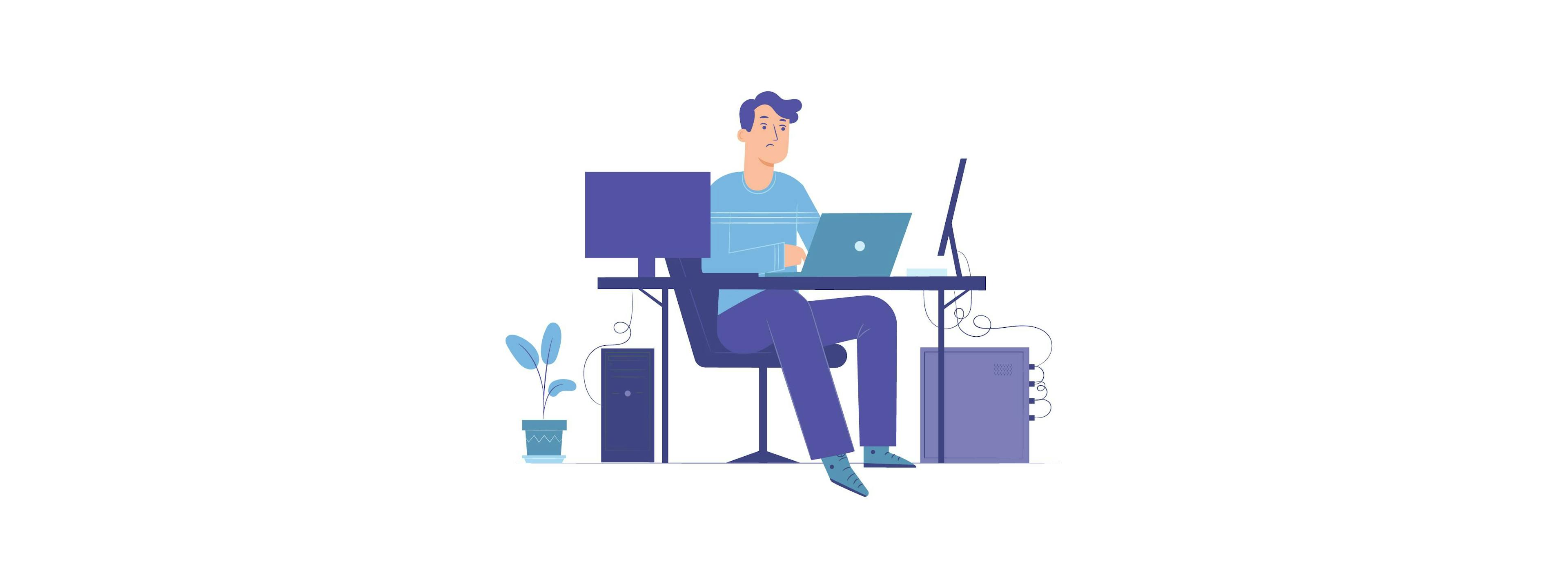15 Bad Work Habits and How You Can Break Them

You wake up to your alarm Monday morning.
Since working remotely, you resort to pressing the snooze button until there’s five minutes before work starts. All you have to do is sit up on your bed and pull out your laptop.
You may decide to eat some breakfast beforehand or you settle for some coffee to make you last until lunch.
Once lunch rolls around, you tell yourself one more hour of work. One hour becomes many. Your phone right by your bedside pings from the notifications and you just have to check out the trends.
Soon the work day ends and you realize you’re exhausted, hungry, and you weren’t as productive as you thought you were.
When it comes to habits, you can probably admit you have a couple (or a few) bad ones! Those bad habits aren’t exclusive to your work life.
With the arrival of COVID-19, most workers were sent home, therefore they have to work remotely for the unforeseeable future. More businesses are switching to distributed teams and we all are grappling this new “normal”. Bad work habits are easy to develop during these unprecedented times but that doesn’t mean we can’t correct them.
Here are 15 bad work habits and ways to correct them all, so you can have a productive day at work and start building new habits that are beneficial to you.
1. Procrastination
It’s so easy to fall into the trap of pushing back doing projects. If there’s a long-term goal, people are more likely to wait until the last possible moment to get it started. That can affect the end product because you have to rush through it. There can be internal and external factors keeping you from starting this project, whether it be family asking you for help in another room, unexpected events that cause delays, or maybe you’re just not feeling it for the day.
Procrastinating on your work doesn’t just affect you, it affects your colleagues as well, because they have to wait for you to get it done.
Solution: A way to stop procrastinating is breaking up your project into smaller sections. You can tackle the project in parts so it doesn’t become overwhelming.
2. Overworking With No Break
Sometimes it seems like you need to work nonstop in order to get the most out of your job. The myth is that by skipping your breaks, you can work more efficiently.
In fact, in one study, managers could not tell the difference between those who put in 80-hour work weeks and those who didn’t. Unfortunately, not taking any breaks can put a strain on your mind and body.
Solution: A simple solution to overworking is planning a few breaks throughout the day. By taking select breaks, you will be able to get more work done efficiently because you won’t be as tired. If you are sick be sure to take a sick day, but only if necessary.
3. Taking Too Many Breaks
Taking too many breaks is something that can stop you from being productive. Snacking every hour, looking at your phone, or just spending a prolonged amount of time not working can cause you to lose focus and also cause you to push back deadlines.
Solution: A way to combat taking too many breaks is to simply restrict the amount of breaks you make. That may seem hard, but give yourself incentives to keep working longer. Ensure that you are taking breaks though because it’s important to break from work mode from time to time.
Get the Friday Chrome extension for focus time and to block out time between meetings or other tasks.
4. No Plan/Goals for the Week
Making things up as you go can only get you so far. You can waste valuable working time by not knowing what projects to tackle or what parts to complete first. With no gameplan, getting overwhelmed with your tasks is more likely to occur by the end of the week.
Solution: To prevent wasting time, set up a planner where you clearly state what you have to do for the week. It can be a physical planner, or an online application. As long as you can see the things you have to do, it’ll make your work more manageable.
Start using the Friday daily planner:
• Connect your calendar and keep a running task list
• Roadmap your day
• Integrate with your favorite project management software
5. Being Disorganized
Whether it’s a messy desk, overflowing email inboxes, or overdue tasks, being disorganized is a bad habit that can really affect your work day.
Solution: Try organizing your desk to know where all your supplies are. In terms of emails, try not to let them pile up and stay unread. Organization can have a positive effect on your behavior which in turn can help you work harder and more efficiently.
6. Bad Communication
When you work remote, you’re not in an office surrounded by your team. It’s so easy to fall in the rabbit hole of not reaching out to them because they aren’t right next to you. You might not reply to direct messages on collaboration applications, leave emails unread, and even miss video conferencing meetings.
Solution: Try to be more proactive in communication as a remote worker. Communication is important for keeping your team informed and connected when working with a remote team. Try to set a certain time during your work day where you touch base with your team on all apps. Check your email and respond to the ones that are more urgent. Direct message for quicker chats.
7. Being too Comfortable With Work
With everything that happened in the world, stability is a luxury. During work, it may seem nice to get into a rhythm of what’s expected of you, but there are downsides to not wanting change. By getting too comfortable with your work it shows that you don’t want to push yourself and improve as an employee.
Solution: Challenging yourself is important career advice that can make you stand out as a coworker. Talk to your boss and your colleagues if they need any help with projects. You can learn a lot by dabbling in projects that aren’t just associated with you and could help advance your career.
8. Distractions
Distractions are hard to avoid. When working remotely, you might have to be surrounded by your family. Your phone is also at arm’s length and social media apps like Twitter keep sending you notifications. These temptations are hard to ignore. Getting distracted can take away from getting work done.
Solution: A good habit you can make is to turn off your phone or set it far away. Try distancing yourself from it for a good amount of time in a day and focus on your work. Also, try to be in a place where you can be the most productive and less distracted. Inform your family about important meetings ahead of time so they can steer clear.
Try the Friday Chrome extension to eliminate the most distracting websites during your focus time.
9. Skipping Lunch
Along with taking no breaks, skipping lunch is a bad workplace habit that brings no benefits. You may want to skip to crunch through work, but that can lower your energy and make you less productive.
Solution: A solution to this is to simply ensure that you are eating lunch. Try not to work when you are hungry because you won’t be able to fully focus. Take a lunch break that can sustain you throughout the work day.
10. Disconnected From the Team
It’s easy to disconnect yourself from your team when working remotely. Everyone is separated doing their own thing on their own schedules. Not touching base with your teammates can hurt productivity in the long run.
Solution: Partake in group video conferences where you can update the team on what you’re working on. Try reaching out to your boss and team so there’s the sense of collaboration and connectivity.
11. Lack of a Proper Workspace
With the rise of people working from home, that means fewer people are working in an office. The United States’ workforce has shifted dramatically to remote work — from 7% pre-pandemic to nearly two-thirds of workers now. It’s been stated that Some people have the luxury of having an at-home-office, but most people have to make do with what they have, whether it be the corner of a living room, or a bedroom.
Solution: Try to make a space for yourself dedicated to work. It’s important to get into the habit of having a place to go where you can be productive. By doing that, you can sustain a good work-life balance.
12. Negativity
Everyone has bad days. Nobody is perfect, so there’s no way to always be 100% at work especially with everything happening in the world at this moment. There is, however, a difference between having bad days, and constantly bringing a negative attitude into the workspace.
Solution: A tip to combat negativity is to identify the source of the problem. If it’s work-related, reach out to your boss or coworkers and see if any changes can be made. If the problem is separate from work, try to acknowledge that your team is there to support you.
13. Too Much Flexibility
Working from home allows for greater independence in choosing your work schedule. When your work schedule is too flexible, there is the lack of a clear routine that can help motivate you throughout the week.
Solution: Even with a flexible schedule try planning out a basic routine that you can follow. Life is unpredictable so changes are okay, but it helps knowing there is structure to your work life.
14. Not Adapting to Technology
In order to stay connected when working remotely, companies are utilizing technology such as video conferencing apps, group chats, and emails.
Solution: Try getting more comfortable with using the applications that help companies stay connected. Reach out to your team to see which applications they use for communication. Stay up to date with video conferencing meetings and keep your devices updated. By using technology socially, workers can increase productivity by 20 to 25%.
15. Multi-Tasking
Multitasking is a habit that comes from good intentions. When working on a team, you want to be able to do the most work the most efficient way. Doing multiple projects all at once, unfortunately, can make you less productive.
Solution: Dedicate yourself to one project for a duration of time. By focusing on one task you can ensure you’re doing your best work. You are allowed to take breaks and switch projects, but try to avoid doing multiple tasks at the same time.
How Friday Can Help With Your Bad Work Habits
Friday is one of the productivity tools that can help you erase your bad habits. It incorporates many features that can help you stay on track during your workday.
- The daily planner is a feature that helps you roadmap your day.
- See when your meetings are so you can plan your day accordingly.
- Write out your tasks in the planner so you know when the deadlines are and you can keep track of them.
- Friday has daily standups and check-ins where you tell yourself and your team what you’re working on for the day and what you accomplished the day prior. It helps you stay on track while also staying connected with your team.
Having bad habits doesn’t make you a bad person. By enforcing positive habits you can improve your work day in the long run. Take the constructive criticism into consideration because it’s never too late to enforce new workplace habits.


